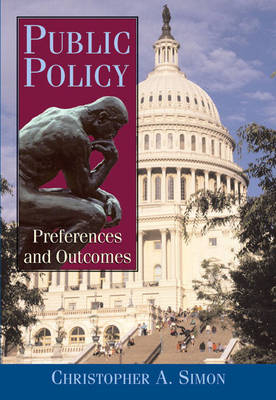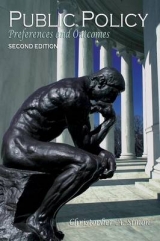
Public Policy
Routledge (Verlag)
978-0-321-11798-4 (ISBN)
- Titel erscheint in neuer Auflage
- Artikel merken
Part I: Introduction to Public Policy
Chapter 1 Policy and Visions of Governance
Chapter Overview
“Liberalism” versus “liberalism”
Classical Liberalism
The Philosophical Softening of Some Assumptions of Classical Liberalism
Scientific Realities and Classical Liberalism
Modern Liberalism and Public Policy
John Rawls
The Nature of liberalism in the United States
Communitarianism
Conclusion
Chapter 2 Theories of Public Policy: How Choices are Made
Chapter Overview
The Importance of Science in Studying Public Policy
The Use of Theoretical Models in Scientific Inquiry
The Rational-Comprehensive Model
Incrementalism
Public Choice
Group Theory
Systems Theory
Institutionalism
Elite Theory
Game Theory
Neo-Institutionalism
Conclusion
Chapter 3 Values and Public Policy
Chapter Overview
Regime Values and Personal Values
Civic Engagement, Social Capital, and Values
Bases of Individual Values
Economics and Value Changes
Values Structures of Four Generational Cohorts
How Values Have and Continue to Change
Conclusion
Chapter 4 Policy Analysis: What becomes a choice? How is it prioritized?
Chapter Overview
Economics
Rise of Policy Sciences
Growth of Public Policy
Tools of Public Policy Analysis
Benefit/Cost Analysis
Demography and Policy Analysis
The Use of Public Opinion Surveys
The Use of Statistics
Decision Theory
Experimentation
Outcomes of Policy Analysis
Ethics and Policy Analysis
Public Policy Spiraling Out of Control?
Policy Analysis is not a “Science”
Conclusion
Part II Policy Process
Chapter 5 Agenda Setting
Chapter Overview
How Does Agenda Setting Work?
The President as Agenda-Setter
Congress and the Policy Agenda
Congressional-Executive Relations and Agenda-Setting
The Courts and the Policy Agenda
Pressure Groups and Agenda-Setting
Bureaucracy and Agenda-Setting
Media and Agenda-Setting
Elections and the Policy Agenda
Cultural Change and Agenda-Setting
Biases in Political Participation and Agenda-Setting
Explaining Agenda Setting
Rational-Comprehensive Model
Institutionalism
Garbage Can Theory
Group Theory
Elite Theory
Conclusion
Chapter 6 Policy Formulation
Chapter Overview
Major Actors in Policy Formulation
Congressional Policy Formulation
Presidential Policy Formulation
Courts and Policy Formulation
Public Bureaucracies and Policy Formulation
International Influences on Policy Formulation
Citizen Stakeholders and Policy Formulation
Demographic Changes and Policy Formulation
Explaining policy formulation
Incrementalism and Policy Formulation
Group Theory and Policy Formulation
Neo-Institutionalism and Policy Formulation
Incrementalism and Policy Formulation
Conclusion
Chapter 7 Policy Implementation
Chapter Overview
A Theoretical Model of Policy Implementation
Controlled Implementation
Prophylactic Implementation
Up-For-Grabs Implementation
Buffered Implementation
Issues Surrounding Implementation
Major Participants
Bureaucracy
Pressure Groups
Clientele
Judicial system
Explaining Policy Implementation
Rational-Comprehensive Model
Elite Theory Explanation
Incrementalism
Group Theory
Conclusion
Chapter 8 Policy Evaluation
Chapter Overview
Policy Sciences and Evaluation
The Policy Analysis v. Evaluation
General Purposes of Evaluation
Internal versus External Evaluation
External Evaluations
Steps in Policy Evaluation
Theoretical Development
Conceptualization
Operationalization
Types of Data and Evaluation
Data and Developing Confidence in Numerical Measurement
Types of Evaluation
Informal Evaluations
Formal Evaluations
Qualitative Approaches to Evaluation
Conclusion
Chapter 9 Federalism and Intergovernmental Relations (IGR)
Chapter Overview
Arguments in Favor of Federalism
Origins of American Federalism
Dual Federalism Model
Cooperative Federalism
Nation-Centered Federalism
Fiscal Federalism
Intergovernmental Relations
Intergovernmental Collaborative Policy Making
Conclusion
Part III Major Public Policies (note: ordering of policy area chapter is subject to change)
Chapter 10 Defense Policy
Chapter Overview
The Defense Policy Structure
Major Participants in Defense Policy
President
Congress
Interest Groups
Military Commanders and Personnel at the “Street Level”
Defense Policy During the Cold War
Nuclear Arms Race
Nuclear Weapons Treaties
Post Cold War Era
Post-Post Cold War Era and the War on Terrorism
Changing Target Populations in the Post-Post Cold War World
Quadrennial Defense Review (QDR)
Ballistic Missile Defense
Homeland Security
Explaining Defense Policy
Elite Theories
Group Theory
Conclusion
Chapter 11 Public Health Policy
Chapter Overview
Major Actors in Public Health Policy
Department of Health and Human Services
Administration for Children and Families
Administration on Aging
Agency for Healthcare Research and Quality
Agency for Toxic Substances and Disease Registry
Centers for Disease Control and Prevention
Centers for Medicare and Medicaid
Medicare: How it Works
Medicaid
Food and Drug Administration
Health Resources and Services Administration
Indian Health Service
National Institutes of Health
Substance Abuse and Mental Health Services Association
Explaining Public Health Policy
Systems Theory
Neo-Institutionalism
Conclusion
Chapter 12 General Social Policy
Chapter Overview
Scope of Social Policy Discussed in Chapter
Major Policy Actors
Major Social Policy Agencies and their Function
Social Security Administration
Social Security Reforms
U.S. Department of Agriculture
Food Stamp Program
Food Distribution Programs
Children Nutrition Program
Women, Infants, and Children (WIC) Program
U.S. Department of Housing and Urban Development
U.S. Department of Labor–Unemployment Compensation
Explaining General Social Policy
Institutionalism
Group Theory
Elite Theories
New Institutionalism
Chapter Summary
Chapter 13 Education Policy
Chapter Overview
History of Education Policy in the United States
Colonial Times
The Federalist Approach to Education
The Common School Movement
Progressive Era Contributions
The Cold War Era
Privatization Alternatives: The 1980’s to Present
Major Participants in Education Policy
Education Policy Reform Proposals
Student Testing
Teacher Quality
Class Size
School Violence
Moving Towards the 21st Century
Bilingual Education
Head Start
Explaining Education Policy
Institutionalism
Group Theory
Incrementalism
Public Choice Theory
Conclusion
Chapter 14 Criminal Justice Policy
Chapter Overview
Major Participants
Courts
Attorneys
Elected Officials
Bureaucracy
Private Enterprises
Interest Groups
Types of Crime
Crime in the U.S. versus Other Industrialized Nations
Homicides
Other Violent Crimes
Property Crime
Drug Crimes
Causes of Crime
Socioeconomic Explanations
Biological Theories of Crime
Crimes and Criminal Procedure
Perspectives on Punishment
Rehabilitation versus Retribution
Three-Strikes and You’re Out
Community Corrections
House Arrest & Electronic Surveillance
Death Penalty
Hate Crimes
Child Abuse
Public Corruption
Contemporary Policing Techniques and Issues
Community Oriented Policing
Racially-Biased Policing
Incarceration Policy and Management
Control Model of Incarceration
Responsibility Model of Incarceration
Consensual Model of Incarceration
The USA Patriot Act, Anti-Terrorism and Criminal Justice Policy
Explaining Criminal Justice Policy
Elite Theory
Group Theory
Institutionalism
Conclusion
Chapter 15 Environmental & Natural Resource Policy
Chapter Overview
Considering the Commons
Key Actors in Environmental Policy
President
Congress
Courts
Pressure Groups
Eco-Terrorism
Land Resources
Resources We Take From Our Public Lands
Timber Resources
Mining In the United States
Coal
Natural Gas
Petroleum
Uranium
Other Materials Mined in the U.S.
Alternative Energy: Protecting the Environment and Reducing Harmful
Extractions
Water Politics and Policy
Major Federal Environmental Laws
Environmental Protection Agency
Explaining Environmental Policy
Elite Theory
Pressure Groups
Institutionalism
Conclusion
Chapter 16 Cost of Policy
Chapter Overview
A Definition of Budgeting
Explaining the Size of the Budget
Budget Cycle
Major Participants & Influences
Congress
President
Courts
Bureaucracy
Pressure Groups
Media
Campaigns & Elections
Domestic Socio-Economic Conditions
Budget Theory
Role Theory
Consensus Model
Dissensus Model
Politics of Entitlement
The Budget and Implications for Policy
Explaining Public Budgeting
Incrementalism
Neo-Institutionalism
Group Theory
Conclusion
Chapter 17 Future of Public Policy
Chapter Overview
Commodification/De-Commodification
Technology and the Future of Policy
Values and the Future of Policy
Conclusion
| Erscheint lt. Verlag | 2.5.2006 |
|---|---|
| Verlagsort | New York |
| Sprache | englisch |
| Maße | 162 x 235 mm |
| Gewicht | 612 g |
| Themenwelt | Sozialwissenschaften ► Politik / Verwaltung ► Politische Theorie |
| ISBN-10 | 0-321-11798-0 / 0321117980 |
| ISBN-13 | 978-0-321-11798-4 / 9780321117984 |
| Zustand | Neuware |
| Haben Sie eine Frage zum Produkt? |
aus dem Bereich



